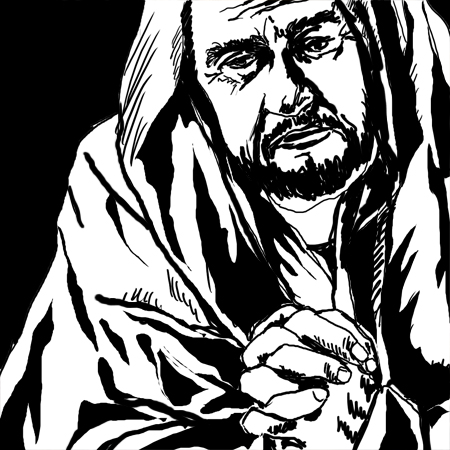 8 Sunday of the Year A
8 Sunday of the Year A
Is 49:14-15; 1Cor 4:1-5; Mt 6:24-34
Introduction: This is a homily/Scripture reflection in a book, titled: ‘Every Week God Speaks We Respond’ Cycle A, intended to be published in the future by Reverend John Tran Binh Trong. It was published in Vietnamese in the US 2009 and republished in Viet Nam 2012. To keep the author’s writing style, this homily has not been edited and may not be by a hired hand.
However, if readers like to point out mistake(s) in spelling and grammar, it would be greatly appreciated by the author whose English is not his mother tongue and who did not live in the US until his adulthood. Passive sentences are used intentionally in this context to avoid using the first personal pronoun ‘I’ when applicable, that might be associated with any idea of egotism, in accord with the French saying, known as: ‘Le moi est haissable’ (The ego is detestable).
Living in the present and modern society, people enjoys a great deal of comfort, but also live in fear. Those who are employees are fearful that they might lose jobs; those who are on public assistance, are fearful that it might be cut off; those capable of work, are fearful that they might not find jobs; those who are retirees are fearful of boring at home. People are afraid of getting sick, gaining weight and getting high blood pressure. They are afraid of getting old; that they may be divorced; afraid of being robbed; afraid that they may get involved in an accident; that their family may break down; that their children may be involved in drugs and gangs.
To cope with those kinds of worry and fear, people find different ways to avail and avoid. They put money, gold in the bank. They keep essential papers in a safety box. They bought all kinds of health insurance for their old age, their homes and vehicles with hope for social security in retirement.
The liturgy of the word today reminds us of one thing, i.e., we should never forget that we depend on God in every single moment of life. God is God of all creatures. He has power to give life and power to take it away. He holds everyone’s destiny in his hand. From the book of Isaiah, the prophet reminded the people even when they were exiled in Babylon, God still loved them and did not abandon them. Even though punished, God still remembered them and delivered them from the slavery.
The message of the prophet Isaiah tells us we should put our trust and faith in God even in our dark days because God did not abandon his people. The Gospel also conveys a similar message. God’s words resound within our ears as consoling words: Stop worrying, then, over questions like, ‘what are we to eat, or what are we to drink, or what are we to wear’. Your heavenly Father knows all that you need (Mt 6:31-32). So does Jesus want us to shirk responsibility for our life? Not really. Jesus only told us not to worry too much. To worry too much about material things might mean we question God’s providence or we lack faith in His care.
Through divine providence, not only does God guide the activities of the human beings, but also animals, vegetables and plants: Look at the birds in the sky. They do not sow or reap, they gather nothing into barns; yet your heavenly Father feed them. Are not you more important than they (Mt 6:26). God also cares for the grass in the field: If God can clothe in such splendor the grass of the field, which blooms today and is thrown on the fire tomorrow, will he not provide much more for you, O weak in faith (Mt 6:30).
Thus among all the creatures of the earth: human beings, animals and things, God is more concerned about the human person, the masterpiece of God’s creation. If God shows concern about the birds in the sky and the grass of the field, he must show concern much more about the human person, created in his image.
Why do we not feel happy with all kinds of insurance for physical life? The answer is we lack spiritual insurance. When our subject, goal and reason to live are not God, but something else - and when that something else is lost - we will fail because we have nothing to cling to. God does not want us to let surroundings control our life. He wants us to live the present in the experience of his love and providence every moment of our life. In order to do so, we need to contemplate his words: Seek first his kingdom over you, his way of holiness, and all these things will be given you besides (Mt 6:33).
A prayer to put faith in God’s providence:
Oh Lord, our God!
You are God of providence and loving care.
You care for the birds of the air and the grass of the field.
And you care much more for us.
Teach me to put my faith in your providence
so that we may not worry too much
about what to eat, drink and wear.
Having your providence for my life,
I will be assured to live my life. Amen.
John Tran Binh Trong
